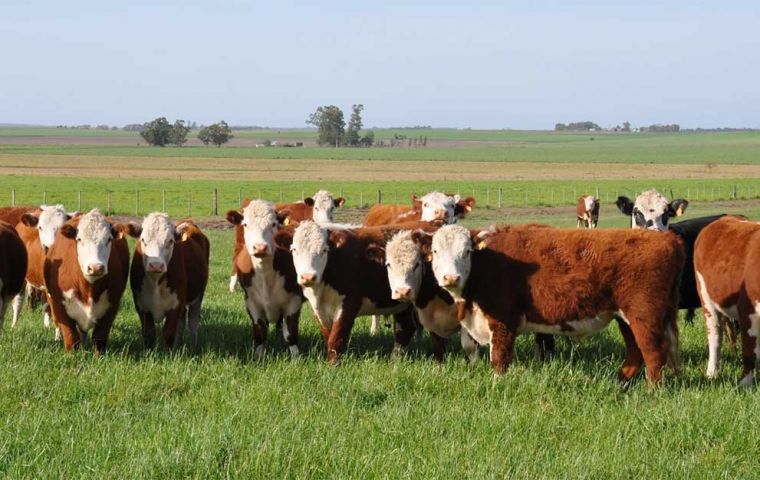MercoPress. South Atlantic News Agency
Uruguay quality beef complies with EU demands on deforestation, sustainability and traceability
 Uruguayan beef is top quality with access to the most demanding global markets
Uruguayan beef is top quality with access to the most demanding global markets The protein consumption of Uruguayans has averaged some 95 kilos per person, a few more kilos than back in 1918, when after reaching a peak of 87, had begun to fall. Of the total 95 kilos, 46 have been beef, with the rest chicken and pork, according to Conrado Ferber, head of the Uruguay National Meats Institute, INAC.
An interesting fact is that despite the significant beef consumption in Uruguay, the country has not ceased to export, and domestic prices have actually fallen. This is because Uruguay exports top class certified beef to some of the most demanding markets in the world, such as China, Japan, Korea, US, Canada, but also imports, purchases beef from Brazil and Paraguay, which do not have the same international quality standing of the Uruguayan produce.
It must also be mentioned that Uruguayan been must pay a 12% tariff in China, 38% in Japan and 20% in Korea.
Ferber also referred to the fact that most pork is imported from neighboring Brazil and that Uruguay together with Costa Rica are in negotiations to join, in the near future, the Trans Pacific trade agreement which should mean more market opportunities for Uruguay’s prime beef.
As to mutton and lamb, given the global erratic performance of this industry, Ferber mentioned that Uruguay manages to export some of the most expensive cuts such as racks and lamb shoulders, while promoting, through television cooking programs the domestic market consumption of other cuts such as barbeque and legs.
Another issue brought up by Ferber referred to the recent regional conference on sustainable cattle breeding held in Punta del Este, also sponsored by FAO, in which Uruguay was able to show that for over two centuries it has bred a sustainable, natural pasture fed cattle, and thus production, fully integrated with the environment and with virtually minimum carbon gas emissions.
Ferber mentioned that FAO admitted that blaming animal breeding, mainly cattle and flocks, as responsible for 18% of global carbon emissions was misleading and has successively brought down that figure to 14% and lately to 12%.
Furthermore the FAO official responsible for cattle breeding issues was invited to visit Uruguay at random periods and was surprised to see calving in a natural environment, no stress, and overall in his report commented “cows seem happy”.
Finally Ferber said that in the recent International Conference on Food Safety and Hygiene, held in Paris, Uruguay signed the European Union demand proving that its cattle was not bred in land gained from deforestation, and that its beef production was sustainable and traceable from birth to supermarket shelves. Despite the fact Uruguay-s topography is basically a rolling ground of pastures, it has strict regulation dating back half a century, protecting natural forests along its fluvial network.





Top Comments
Disclaimer & comment rulesCommenting for this story is now closed.
If you have a Facebook account, become a fan and comment on our Facebook Page!